How search for knowledge helped lift China's reform
Foundation leader says nation developed by learning, and now can teach other countries a thing or two
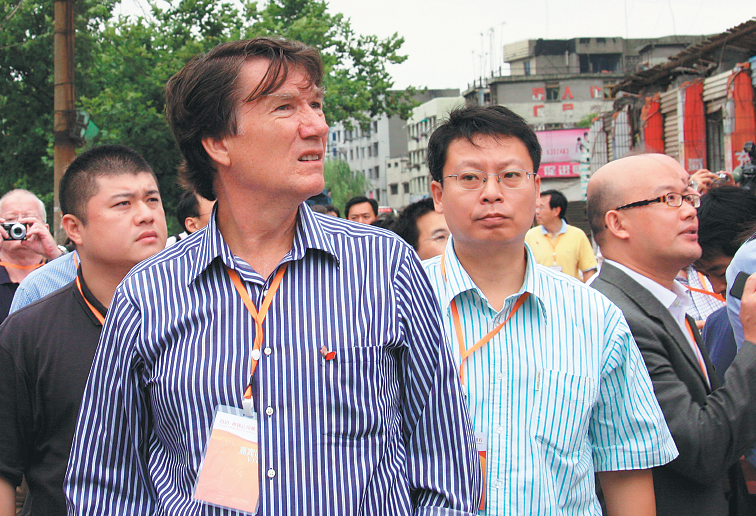 |
|
John L. Holden visits Wenchuan county in Sichuan province shortly after the devastating 2008 earthquake. [Photo provided to China Daily] |
John L. Holden, president and CEO of the US-China Strong Foundation, said China was a totally different country when he paid his first visit in 1974. That year, he spent three weeks traveling throughout the mainland.
"I must say, I was happy to be in China," he said. "The Chinese people were welcoming and friendly. But it was clear to me that China then was experiencing a very difficult time. The country was extremely poor."
People did not have enough food, and families could not all go out at once because they didn't have enough clothes for everyone, he said.
Holden, whose foundation seeks to strengthen the capacity of young Americans to understand China, said two major events helped the nation open up: One was United States security adviser Henry Kissinger's secret visit to China in 1971, and the other was Deng Xiaoping ushering in reforms.
"People at that time did not know what the future was going to be, but they knew one thing: China had to change - there was no doubt about that," Holden said. "There wasn't a clear vision of exactly where China wanted to end up. That's why Deng Xiaoping said, 'We cross the river by feeling the stones'. That empirical experiment-based reform worked really well for China."
Deng's reform and opening-up began with agriculture in December 1978. Farming in China was decollectivized, and emphasis was put on the household responsibility system, which divided the land of the people's communes into private plots.
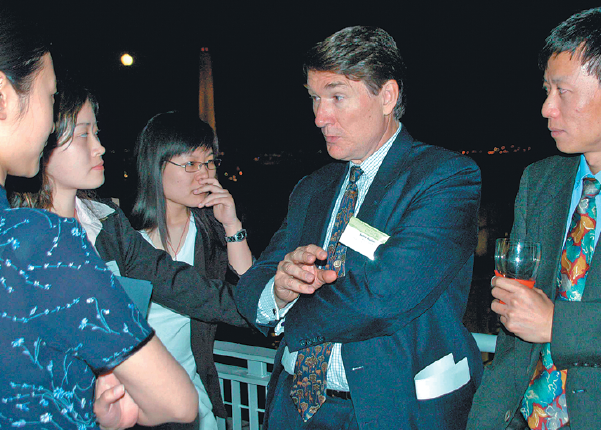 |
|
Holden talks with Chinese students at George Washington University in Washington during a symposium on US foreign policy in June 2004. [YU DONGHUI/CHINA NEWS SERVICE] |
Under the new policy, farmers were able to exercise formal control of their land as long as they sold a contracted portion of their crops to the government, which resulted in an increase in production.
Holden returned to Beijing at the end of 1980, and the following year he spent six months traveling across the country as an interpreter.
He visited many places up and down the Yellow River, and was in the Tibet autonomous region for five weeks. During this trip, he saw a lot of China and got a sense of what was happening in the countryside.
"So many farmers' lives were improved dramatically by reform and opening-up," he said. "I realized that if they had the incentive to produce their own food and sell it, and they had a market to sell it in, lots of things became possible."
He said reform and opening-up removed the barriers that prevented the Chinese from being successful.
In addition to material benefits, the opening of Chinese people's minds has made a deep impression on Holden, a veteran China expert who served as president of the National Committee on US-China Relations from 1998 to 2005 and later became an associate dean at Peking University.
"That's actually the biggest change in China - the acquisition of knowledge, which was not available before," he said. "The idea that the average person could have a passport and travel overseas was an incomprehensible and impossible idea even in 1985,'86 or'88."
In 1980, when Holden was living in Washington, China established an encyclopedia publishing house. "They realized there were just big gaps of knowledge. They started the conversation with the Encyclopaedia Britannica in Chicago," he said.
In the summer of that year, China Encyclopedia Publishing House announced it would translate the Encyclopaedia Britannica into Chinese. Holden served as interpreter at a news conference in Washington to announce the partnership.
To Holden, it was a major signal that China was ready to learn about the outside world and wanted as much knowledge as possible.
"That was a major step to opening-up. That was the beginning to show a clear purpose from the Chinese people to be open to new ideas. Over the past 40 years, China has accomplished a great deal, and the Chinese people have been enabled to fully utilize their work habits and entrepreneurial spirit to create a better future for themselves."
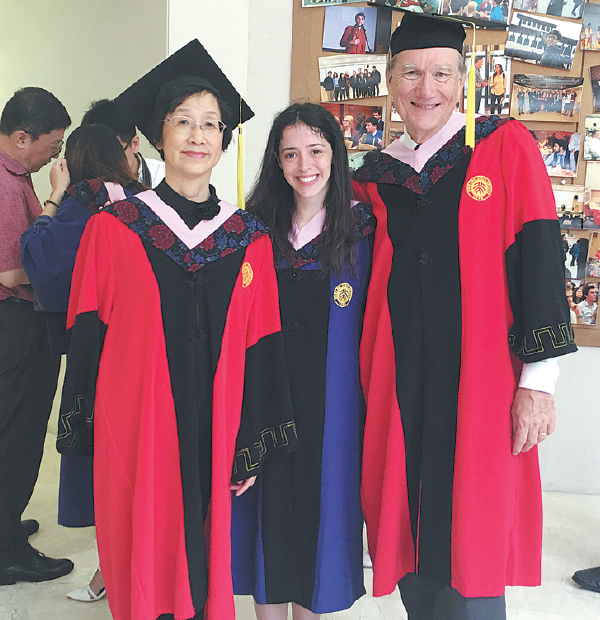 |
|
Holden and Yuan Ming (left), dean of Peking University's Yenching Academy, pose with a scholar during the graduation ceremony for the academy's inaugural class in Beijing in 2016. [Photo provided to China Daily] |
Holden said there are two major lessons the Chinese have learned over 40 years of tremendous change.
"One thing is that change is good, necessary and possible. The idea of reform is closely aligned with progress. That is a major conclusion that people have. Things can always be made better," he said. "The second thing is opening-up. For China to open its door to invite foreigners and foreign ideas in, and to open its doors for its own people to travel, to study abroad, this is a very good thing."
At the Boao Forum for Asia on April 10, President Xi Jinping said China will continue to adhere to its fundamental national policy of opening-up and pursuing development with its door wide open.
Holden said he believes there are several dimensions to openness. One is the interaction with the outside world on trade and investment. "For that, one can certainly see China has plans to do more," he said.
Another dimension is China taking a bigger role on the world stage and in international organizations to shoulder more responsibility on common goals, he said, while a third dimension, opening to new ideas, is essential because innovation and technology matter to future economic growth.
"Quoting every previous (US) president since Richard Nixon, they all meant that we hope that China will be successful, which is good for a quarter of the world's population, and eventually will be good for the rest of the world. We hope that. Together with that is a sense of being open to all kinds of ideas."
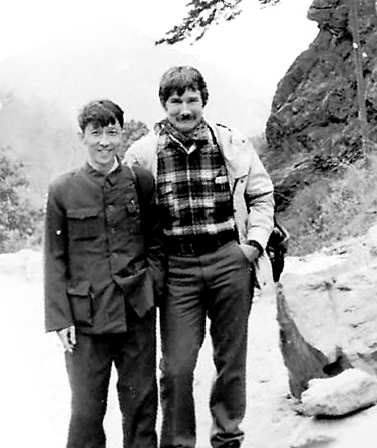 |
|
Holden (right) with his fellow interpreter during a visit to China in the summer of 1981. [Photo provided to China Daily] |
China's practice of reform and opening-up has been widely acknowledged across the world, according to Holden.
"Every country should look at China for certain, but to pick and choose what it wants and what it doesn't want," he said. Looking ahead, Holden said every country will need to work together, particularly on issues like artificial intelligence and advanced biological development.
"We have to continue talking with each other and deal with some of the problems because these are really global issues. If one country goes way off in this direction by itself, that could be problematic. We do need to coordinate. We have to have conversations on AI," he said.
"There is a lot to work on. It requires big investment from Americans and Chinese to create a better future. Right now, it's a challenging time, and we have to do more."
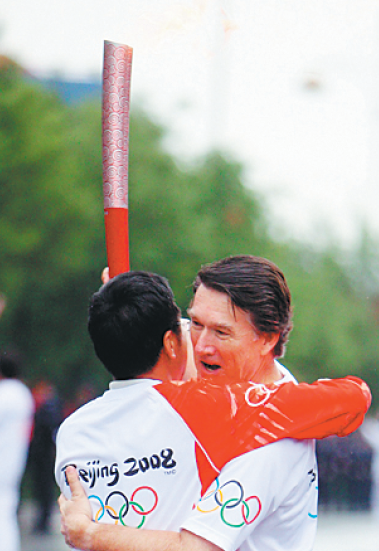 |
|
Holden takes part in the torch relay for the 2008 Beijing Olympics as a torchbearer. [Photo/Xinhua] |

 Print
Print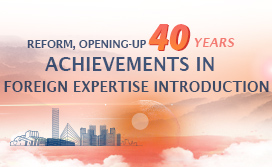 Reform, Opening-up 40 Years: Achievements in Foreign Expertise Introduction
Reform, Opening-up 40 Years: Achievements in Foreign Expertise Introduction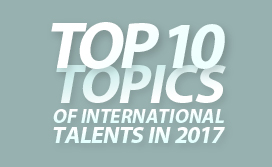 Top 10 topics of international talents in 2017
Top 10 topics of international talents in 2017


